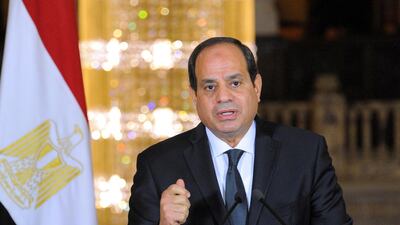Egypt says it has staged large-scale naval war games in the Mediterranean, throwing into the drills some of its most valuable and recent acquisitions, including a French-made helicopter carrier and a German-made submarine.
It’s Egypt’s latest show of force in the Mediterranean since tension began to build up in neighbouring Libya over Turkey’s declared intention to militarily intervene in the North African nation.
A video posted late Saturday on the official Facebook page of the armed forces' spokesman showed a Mistral troop and helicopter carrier with its combat escort of two frigates and rocket-launching vessels. It also showed the German submarine cruising on the surface as well as anti-submarine vessels.
A voice-over said the war games, which included helicopter gunships, F-16 jet-fighters and commandos, were part of the armed forces’ “training plans,” an attempt to distance the war games from the situation in Libya, where Egyptian ally Field Marshal Khalifa Haftar has been fighting his way to the capital Tripoli, home to the Turkish-backed National Accord government, since April.
It is the second Egyptian war games in less than a month, reflecting Egypt’s desire to send a message of deterrence to Turkey, where parliament on Thursday authorised the dispatch of troops to fight alongside the militant groups linked to the Tripoli government against Haftar’s forces.
They come two days after Egyptian President Abdel Fattah El Sisi summoned the country’s highest security body to a rare meeting to review what an official statement described as threats from “outside military intervention” in Libya following Turkey’s vote to send troops to Tripoli.
While well short of a declaration of war, the statement’s language suggested Egypt intended to do much more now to support Field Marshal Haftar, who has declared his intention to free Tripoli from the militant groups defending the capital.
Thursday’s meeting of Egypt’s National Security Council, according to the statement, “adopted a package of measures on all levels to counter any threat to Egyptian national security." It did not say what those measures would be, but President El Sisi has repeatedly warned in recent weeks that Egypt would not tolerate foreign domination of Libya.
"What takes place in Libya impacts on Egypt’s national security," he has said.
Egypt shares a 1,200-kilometre desert border with Libya, an energy-rich nation that has been mired in chaos and violence since a 2011 uprising toppled and killed dictator Muammar Qaddafi.
Egypt blames Libya-based militants for deadly attacks in recent years against its security forces and minority Christians travelling to remote desert monasteries near the Libyan border.
It has on occasion announced air strikes against militants in eastern Libya, including some after the 2015 beheading of 21 Coptic Christians. by ISIS.
A recent maritime agreement between Ankara and Tripoli’s government, dismissed as illegal by Cairo and Libya’s House of Representatives, significantly expanded Turkey’s continental shelf, in theory infringing on Egypt’s plans with Cyprus, Greece and Israel to turn the east Mediterranean into a global energy centre after the discovery of natural gas in massive quantities there.
Turkey has been unhappy that it was left out of these plans and has been trying to force itself into the scheme. It has explored for gas off the shores of EU-member Cyprus, of which Turkey has occupied a third since 1974 when it invaded after a short-lived, Greek-inspired coup.
In a related development, Saudi Arabia on Sunday condemned the Turkish parliament's approval of a military deployment to Libya. "Saudi Arabia expresses its rejection and condemnation of Turkey's latest escalation in the Libyan issue," the official Saudi Press Agency said, citing the foreign ministry.
"This Turkish escalation forms a threat to security and stability in Libya as well as to Arab security and regional security as it is interference in the internal affairs of an Arab country in flagrant violation of all relevant international covenants and principles," the SPA report said.


